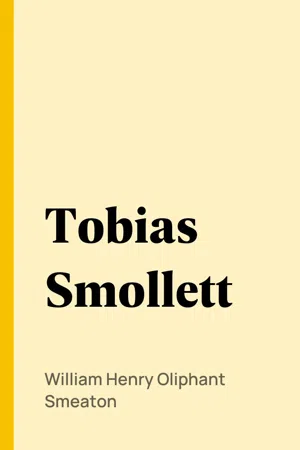
- English
- ePUB (mobile friendly)
- Available on iOS & Android
Tobias Smollett
About this book
Example in this ebook
CHAPTER I: BIRTH—PARENTAGE—EARLY YEARS
'Every successful novelist must be more or less a poet, even though he may never have written a line of verse. The quality of imagination is absolutely indispensable to him.... Smollett was a poet of distinction!'
Such was the estimate formed by Sir Walter Scott—one of the most incisive and sympathetic critics that ever pronounced judgment—of the element of inspiration in every great writer of fiction. Experimentally conscious of what was of value in his own case,—himself the great Wizard of Fiction,—he would reason by analogy what would be of power to inspire other men. If the poetic faculty were indispensable for the production of The Heart of Midlothian and Ivanhoe, equally would it be needed in Peregrine Pickle and Humphrey Clinker. That the poetic stimulus is the most powerful of all, is a truth that has been remarked times and oft. That it forms the true key to unlock the otherwise elusive and self–centred character of Tobias George Smollett, has not, I think, previously been noted.
To write Smollett's life with absolute impartiality is more than ordinarily difficult. The creator of Roderick Random was one for whom a generous charity would require to make more allowances than man is commonly called upon to make for man. Actions and utterances that might be and were mistaken for irritation and shortness of temper, were in reality due to the impatience of genius, chafing under the restrictions laid upon it by the mental torpor or intellectual sluggishness of others. The eagle eye of his genius perceived intuitively what other men generally attain only as the result of ratiocinative process. Smollett has unjustly been characterised as bad–tempered, choleric, supercilious, and the like, simply because the key was lacking to his character. Far indeed from being any of these was he. Impatient without doubt he was, but by no means in larger measure than Carlyle, Tennyson, Dickens, Goethe, or Schiller, and the feeling is wrongly defined as impatience. It is rather the desire to give less intellectually nimble companions a fillip up in the mental race, that they may not lag so far behind as to make intercourse a martyrdom.
Smollett's distinguishing characteristic in the great gallery of eighteenth–century novelists was his exhaustless fertility. In his four great novels, Roderick Random, Peregrine Pickle, Ferdinand Count Fathom, and Humphrey Clinker, he has employed as many incidents, developed as many striking situations, and utilised as many happily conceived accidents of time and place, as Richardson, Fielding, Sterne, Henry Mackenzie, and Mrs. Radcliffe put together. His invention is marvellously fertile, and as felicitous as fertile. He makes no attempt to excel in what may be termed the 'architectonic' faculty, or the symmetrical evolution and interweaving of plot. Incident succeeds incident, fact follows fact, and scene, scene, in the most bewildering profusion. There is a prodigality visible, nay, an intellectual waste, indicative of an imaginative wealth almost unique since the days of Homer. By some critics, following in the footsteps of Sir Walter Scott, a curious vagary has been rendered fashionable of introducing the method of comparative analysis into every literary judgment. In place of declaring in plain, straightforward terms the reason why they either admire or censure the works of a man of genius, they must now drag in somebody else, with whom he is supposed to present points of affinity or contrast, and they glibly descant on the attributes wherein the author under consideration surpasses or falls short of his rival, what elements and qualities of style the one possesses which the other lacks, until in the end the reader is thoroughly befogged to know which is which and who is who. The higher criticism has its place in literary judgments as well as in theological, and the change is not for the better.
To be continue in this ebook
Tools to learn more effectively

Saving Books

Keyword Search

Annotating Text

Listen to it instead
Information
Table of contents
Frequently asked questions
- Essential is ideal for learners and professionals who enjoy exploring a wide range of subjects. Access the Essential Library with 800,000+ trusted titles and best-sellers across business, personal growth, and the humanities. Includes unlimited reading time and Standard Read Aloud voice.
- Complete: Perfect for advanced learners and researchers needing full, unrestricted access. Unlock 1.4M+ books across hundreds of subjects, including academic and specialized titles. The Complete Plan also includes advanced features like Premium Read Aloud and Research Assistant.
Please note we cannot support devices running on iOS 13 and Android 7 or earlier. Learn more about using the app